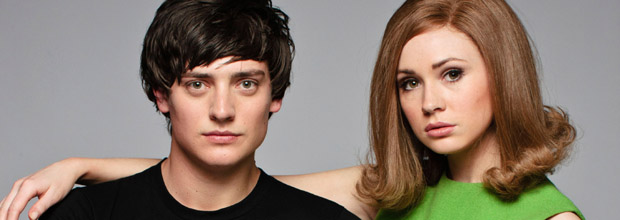
As Amy Pond she travelled across all of Time and Space, as Swinging London supermodel Jean Shrimpton she’s off to New York. But is We’ll Take Manhattan a good start for a post-Who Karen Gillan?
1962. No one had heard of The Beatles and there was no such thing as ‘youth culture’ beyond a cheeky smoke behind the bike sheds and a chat about what Korky the Cat was up to in The Dandy. And then, so We’ll Take Manhattan boldly states: ‘Along came David Bailey and Jean Shrimpton’.
Karen Gillan is the gorgeous Jean Shrimpton, doing her darndest to stifle her delightful Scottish brogue and squeeze into an English accent. Though it’s difficult to ignore this (and it does slip from time to time) she otherwise does well with the slim material on offer.
Her early scenes as the shy and awkward young thing starting modelling school are great, and her character carries a curious China Doll fragility about her throughout, but unfortunately her talent feels underused. John McKay’s script soon allows her to become eclipsed by Aneurin Barnard as the cheeky Cockney haircut with a camera, David Bailey.
Barnard makes a great job of portraying Bailey, even if he does skirt the edges of a dodgy Michael Caine impression in his shouty moments. He’s the leather-jacketed avatar of the youth culture upheaval that would come to dominate the ‘60s; a shutter speed rebel out to set the trend and document it through his lens.
 Set in direct counterpoint to the ideals he represents is the ever-excellent Helen McCrory, as the Miranda Priestly of ‘60s British Vogue, Lady Clare. A purposely unlikeable Dior-clad Doberman, she grows from haughty irritant to an antagonising representation of the entire old establishment that David Bailey was wrestling against.
Set in direct counterpoint to the ideals he represents is the ever-excellent Helen McCrory, as the Miranda Priestly of ‘60s British Vogue, Lady Clare. A purposely unlikeable Dior-clad Doberman, she grows from haughty irritant to an antagonising representation of the entire old establishment that David Bailey was wrestling against.
It’s a very two-dimensional character – a pantomime villain for the catwalk – but McCrory gives it her all and makes a better job of it than it otherwise deserves.
That’s the problem with We’ll Take Manhattan: John McKay’s script doesn’t feel strong enough to support its stars, who feel either woefully underwritten, as in the case of Shrimpton, or like caricatures. McKay’s directing, especially during the outdoor New York scenes, feels vibrant and fresh, which only further highlights the tepidity of the writing.
It’s a drama that has been touted in press releases as ‘an explosive love affair’, but it’s less explosive and more snap, crackle and pop-culture. This is a relationship which David Bailey would end his marriage over and yet it lacks attention.
The real love affair explored here is Bailey’s passion for photography. The focus on his determination to break the staid photographic rules of fashion magazines makes his relationship with Shrimpton seem incidental; a secondary development of his desire to change how fashion looks at photography, and how photography looks at fashion.
We’ll Take Manhattan is an odd beast. As a love story it feels lukewarm. As an article of fashion history it feels incomplete. As a dramatic explanation as to how the fashion industry changed focus toward the young it just about works. Just.
Here’s hoping we’ll see both Karen Gillen and Aneurin Barnard in better things soon: the audience may take to them, but they’re unlikely to do the same to We’ll Take Manhattan.
![]()
Airs at 9pm on Thursday 26th January 2012 on BBC Four.
> Buy Jean Shrimpton’s autobiography on Amazon.
What did you think of We’ll Take Manhattan? Let us know below…

